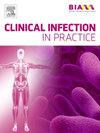健康儿童拉赫氏菌血症首例报告
Q3 Medicine
引用次数: 0
摘要
drahnella是一种环境革兰氏阴性杆菌,很少作为人类病原体报道,通常在免疫功能低下的个体或慢性疾病患者中。我们报告了第一例已知的由拉赫氏菌引起的菌血症,这是一名没有合并症或可识别的危险因素的儿科患者。病例报告:一名先前健康的4岁瑞士女孩,表现为长时间发烧和腹痛,没有明确的感染灶。实验室检查显示白细胞增多和炎症标志物升高。结果经静脉滴注头孢曲松治疗后,因轻度过敏反应改用美罗培南治疗,临床改善迅速。患者完成了10天的抗生素疗程,完全康复,无并发症。结论本病例突出了拉赫氏杆菌作为真正病原体的能力,即使在没有明显合并症的患者中也是如此。我们的研究结果提示需要重新考虑Rahnella sp.的临床相关性,它可能在免疫能力强的宿主中引起侵袭性感染,而不仅仅是在易感人群中引起机会性疾病。本文章由计算机程序翻译,如有差异,请以英文原文为准。
First case report of Rahnella bacteremia in a healthy child
Background
Rahnella species are environmental Gram-negative bacilli rarely reported as human pathogens, typically in immunocompromised individuals or those with chronic medical conditions. We report the first known case of bacteremia caused by Rahnella species in a paediatric patient without comorbidities or identifiable risk factors.
Case Report
A previously healthy 4-year-old Swiss girl presented with prolonged fever and abdominal pain without a clear infectious focus. Laboratory tests showed leukocytosis and elevated inflammatory markers.
Results
Blood cultures grew Rahnella sp. Empirical treatment with intravenous ceftriaxone, later switched to meropenem due to a mild allergic reaction, led to rapid clinical improvement. The patient completed a 10-day antibiotic course and fully recovered without complications.
Conclusion
This case highlights the capacity of Rahnella sp. to act as a true pathogen even in patients without significant comorbidities. Our findings suggest a need to reconsider the clinical relevance of Rahnella sp., which may cause invasive infections in immunocompetent hosts—not just opportunistic disease in vulnerable populations.
求助全文
通过发布文献求助,成功后即可免费获取论文全文。
去求助
来源期刊

Clinical Infection in Practice
Medicine-Infectious Diseases
CiteScore
2.10
自引率
0.00%
发文量
95
审稿时长
82 days
 求助内容:
求助内容: 应助结果提醒方式:
应助结果提醒方式:


